Archive for September, 2012
Грузия голосует за Парламент.
24 Sep 2012 «Скандал с избиениями и извращенным насилием в тюрьмах стал моральной пыткой для грузинского общества. На него накладывается близость парламентских выборов, в которых окончательно спутались все расклады. 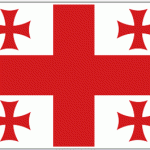
До скандала правящей партии президента Саакашвили социологи отдавали около 60 процентов голосов, а ее основному сопернику, партии бизнесмена Иванишвили, около 30, но теперь прогнозы пошли прахом. Президентская партия лишилась поддержки тех, кто еще думал, за кого голосовать, — говорят одни. Возможно, очищение после этой грязной истории пойдет власти на пользу, — возражают другие. Но в действительности, чем закончатся выборы, не знает никто… »
Репортаж – Айдер Муждабаев Московский Комсомолец № 26049 от 24 сентября 2012 г. Ayder Muzhdabaeyev Moskovskij Komsomolets
Bielorussia, ennesima elezione contestata.
23 Sep 2012 Intimidazioni, arresti di oppositori, litigi geopolitici. Ad ogni elezione in Bielorussia va in scena sempre lo stesso canovaccio. Non fanno eccezione le legislative di quest’anno.
Da martedì 18 settembre hanno già usufruito del voto anticipato ben il 20% degli aventi diritto. Secondo varie denunce le urne con le schede al loro interno rimarrebbero senza controllo e qualsiasi tipo di broglio sarebbe possibile. 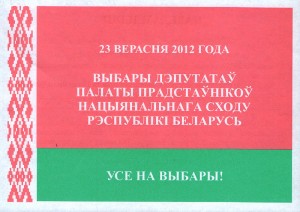
Sono oltre trecento i candidati che si contendono i 110 seggi parlamentari. Dovranno vincere con la maggioranza assoluta nella propria circoscrizione e sperare che l’affluenza alle urne sia superiore del 50% degli aventi diritto. Altrimenti sarà necessario un secondo turno.
I candidati vicini al presidente Lukashenko sono destinati a far man bassa di mandati parlamentari. Le opposizioni hanno infatti ritirato i propri rappresentanti a pochi giorni dal voto. “Queste sono state la peggiore campagna elettorale e le peggiori legislative di sempre”, la loro giustificazione.
Dal 1996 Unione europea, Stati Uniti ed Osce non riconoscono la validità delle elezioni bielorusse, minate da palesi violazioni e lontanissime dagli standard internazionali.
Questa volta una missione dell’Osce, l’Organizzazione per la sicurezza e la cooperazione in Europa, è stata invitata a presenziare alle legislative. Ma a due suoi osservatori (un tedesco ed un lituano) non è stato inspiegabilmente concesso il visto di ingresso.
Ad inizio settimana alcuni giornalisti stranieri, che avevano partecipato ad un incontro organizzato dalle opposizioni, sono finiti dietro alle sbarre. Ad un australiano della SBS è stata sequestrata l’intera attrezzatura all’aeroporto di Minsk.
Da anni Lukashenko ed alcuni alti funzionari bielorussi non possono mettere piede in Unione europea e negli Stati Uniti, dove sono stati dichiarati “persone non benvenute”.
Rispetto ad un paio di anni fa la situazione economica è migliorata anche se l’economia bielorussa rimane sull’orlo dell’abisso. Finora Minsk si è salvata soltanto grazie all’aiuto finanziario di Mosca, che teme di trovarsi alle frontiere un governo pro-occidentale. In cambio di questo sostegno la Russia si è comprata gli oleodotti e i gasdotti in transito sul territorio bielorusso verso l’Europa.
Bykivnia, the Ukrainian Katyn.
21 Sep 2012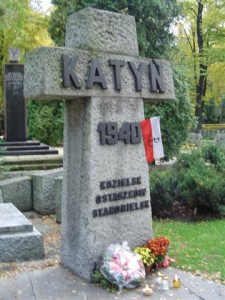
copyright EuropaRussia
“We had to wait a long time for this moment, fervently believing that it must come to pass. It is difficult to find words that express how we Poles feel” Polish President Bronislaw Komorowski said during the ceremony.
The wooded site at Bykivnia is understood to be the final resting place of 3,435 Polish citizens murdered in 1940 on Stalin’s orders by the Soviet secret police (NKVD).
The executions were part of the broader Katyn Crime in which over 22,000 Poles – largely reserve officers – were killed in mass executions at various points across the Soviet Union, including the Katyn Forest near Smolensk.
The final resting place of the Poles on the so-called “Ukrainian Katyn List” had long remained a mystery. In 2007, Polish archaeologists working at Bykivnia discovered the dog tags of Sergeant Jozef Naglik, as well as a comb with the names of four Poles inscribed on it.
The names tallied with the so-called Ukrainian List, which makes up about 15 percent of the Poles executed during the Katyn Crime. Identifying individual victims has proved largely impossible.
According to researched data, the mass burials in Bykivnia are the largest ones in Ukraine. Preliminary estimates indicate that during 1937-1941 more than 100,000 Ukrainians were also destroyed and secretly buried here.
Ukrainian President Vikor Yanukovich called the opening of the Polish war cemetery a “a moment of Solidarity between the two nations.”
Sources: Polish Radio, Memorial Kiev
Exhibitaly: Italian excellence in Moscow.
12 Sep 2012 Made in Italy takes centre stage in Moscow for four months in an exhibition at Moscow’s former chocolate factory and urban icon ”Krasni Oktiabr”, whose façade will be permanently lit with a 3-colour rendition of the Italian flag.
The Patriarshi most, the footbridge across the Moskova opposite the factory, will be transformed from 12 September to 28 October into an open-air “grand tour of Italy”, with ten transparent cases displaying Italian-made icons, which will include dresses by Valentino, Salvatore Ferragamo and Ermenegildo Zegna, a Ferrari, a Vespa, an Aprilia and two giant Arcimboldo sculptures in celebration of pasta and wine.
The initiative is entitled ”Exhibitaly – Italian excellence today” and was presented in Moscow (and simultaneously at Palazzo Chigi in Rome) at the Headquarters of the Itar-Tass agency by Italian Ambassador Antonio Zanardi Landi. “We intend by this event to further enhance our image”, he explained, citing a rise of 33% in Italian exports to Russia 2011 (according to the more realistic Russian statistics that keep track of the origin of imports), along with increased Russian tourism in Italy (visas issued are up 40%).
The Government has earmarked €4.5 million for the promotion of Made in Italy in Russia – “an important sign at a moment when we are seeking to unite rigor with growth”, the ambassador commented in the margins of the event. The opening is planned for 12 September, with “The energy show”, two exhibitions curated by ENEL, to be followed by home design (11-28 October), fashion design (7-27 November) and innovation (5 December ’12 – 6 January ’13). A broad series of side events are also planned involving the works of famous Italian Renaissance and major contemporary artists.
source: Italian Foreign Ministry
APEC Leaders issued a Declaration at the conclusion of the 20th APEC Economic Leaders’ Meeting in Vladivostok on Sunday, revealing pathways to strengthen the Asia-Pacific region’s prosperity and leadership in the global economy.
The Declaration outlines APEC Leaders’ view on addressing the challenges and downside risks within the global economic environment, including financial markets that remain fragile. 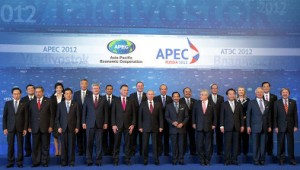
During Sunday’s session, Leaders were briefed by International Monetary Fund Managing Director, Christine Lagarde.
The Declaration details steps for building on the progress achieved by member economies in realizing APEC’s 2012 priorities:
- Trade and Investment Liberalization, Regional Economic Integration
- Strengthening Food Security
- Establishing Reliable Supply Chains
- Intensive Cooperation to Foster Innovative Growth
Several annexes accompany the Declaration:
- Annex A. Towards innovative growth
- Annex B. Strengthening APEC energy security
- Annex C. APEC list of environmental goods
- Annex D. Promoting cross-border education cooperation
- Annex E. Fighting corruption and ensuring transparency
Leaders also welcomed the invitation from Indonesia President Susilo Bambang Yudhoyono to meet in Bali in 2013.
Приключения немца в российском банке.
10 Sep 2012«Банкомат сожрал карточку. Банкомат солидного российского банка. Я даже не понял, в чем дело. Наверно, что-то «проспал», не туда нажимал. Честно говоря, со мной такое не первый раз. Банкоматы всех национальностей — мрачно-абсурдные, кафкианские существа. А вторая карточка, только что выпущенная, лежит еще там, в Германии. И в квартире у меня нет миллиона евро, не дорос я пока до уровня Ксении Собчак. Но деньги нужны срочно — заплатить налоги за весь прошлый год, сумма приличная. Кроме того, жена заказала новую кухню… »
Статья Штефан Шолль – Московский Комсомолец № 26030 от 1 сентября 2012 г., Stefan Scholl Moskovskij Komsomolets.
Вопрос №1:
Кто победил в Бородинском сражении? Кутузов и Наполеон считали итогом битвы победу своей армии.
Вопрос №2:
Русские войска отступили и от Бородина, и от Москвы, а Наполеон вошел в Москву? Не является ли это свидетельством поражения?
Вопрос №3:
До сих пор ведутся споры о том, какова была численность обеих армий перед сражением и каковы были потери. Можно ли говорить, что российская армия превосходила по численности французскую?
Вопрос №4:
Можно ли утверждать, что французы выиграли сражение, но проиграли войну в целом?
Вопрос №5:
Для кого Бородинское сражение и его итоги были важнее — для Наполеона или для Кутузова?
Отвечают:
Александр Валькович президент Международной военно-исторической ассоциации
Наталья Басовская профессор РГГУ, историк
APEC CEO Summit 2012 Program. Vladivostok.
6 Sep 2012Day 1 Friday, September 7
| 09:00 – 09:15 | Welcome and opening ceremony | ||||
Conducted by Andrey Kostin, APEC CEO Summit Chairman
09:15 – 10:30Panel discussion:
Economic integration: benefits and unintended consequences
Moderator: Tian Wei, Anchor, CCTV
Discussion participants:
The Right Honourable John Key MP, Prime Minister of New Zealand
Igor Shuvalov, First Deputy Prime Minister of the Russian Federation
Dennis Nally, Chairman, PwC International
John Faraci, Chairman and CEO, International Paper
10:30 – 11:00Coffee break
11:00 – 12:00Panel discussion:
How many currencies does the world need?
Moderator: David Pilling, Asia Editor, Financial Times
Discussion participants:
Clifford Bennett, Chief Economist, White Crane Group
Andrey Kostin, Chairman of the Management Board, VTB Bank, APEC CEO Summit Chairman
Jing Ulrich, Managing Director and Chairman of Global Markets – China, JPMorgan Chase
12:00 – 13:00Panel discussion:
Resources: what are the limits to growth?
Moderator: Dominic Barton, Managing Director, McKinsey & Company
Discussion participants:
Michael Klare, Director of the Five College Program in Peace and World Security Studies (PAWSS)
Igor Sechin, President, Rosneft (TBC)
Peter Voser, CEO, Royal Dutch Shell plc
13:00 – 14:00Networking lunch
14:00 – 15:00Interactive sessions convened concurrently
Panel discussion:
Water: new global strategic resource
Moderator: Fedor Lukyanov, Editor-in-Chief of the Russia in Global Affairs magazine
Discussion participants:
His Excellency Truong Tan Sang, President of the Socialist Republic of Viet Nam
His Excellency Sebastián Piñera, President of Chile
Umran Beba, Region President, Asia Pacific, PepsiCo
Chew Men Leong, Chief Executive, Singapore’s national water agency, PUB
Session: Food: feeding seven billion people
Moderator: Vyacheslav Nikonov, President, Polity Foundation, Deputy of the State Duma of the Federal Assembly of the Russian Federation
Discussion participants:
Samuel Allen, Chairman of the Board, John Deere & Co.
Craig Emerson, Minister for Trade and Competitiveness of Australia
Ning Gaoning, Chairman of COFCO
Kazuhito Yamashita, Research director of the Canon Institute for Global Studies
15:00 – 15:15Break
15:15 – 16:15Interactive sessions convened concurrently
Panel discussion:
Supply chains: ever more efficient, ever more vulnerable?
Moderator: Donald Almeida, Vice Chairman Clients and Markets, PwC
Discussion participants:
Igor Levitin, Adviser to the President of the Russian Federation
Ziyavudin Magomedov, Chairman of the Board of Summa Group
Scott Price, President and CEO, Walmart Asia
16:15 – 16:30Break
16:30 – 17:30Panel discussion:
Infrastructure for sustainable growth
Moderator: Aleksandr Gabuev, Deputy Editor-in-Chief of Kommersant Vlast’ Weekly
Discussion participants:
Oleg Budargin, Chairman, FGC UES
Pat Dawson, Asia Pacific President, The Dow Chemical Company
Oleg Deripaska, President, En+ Group, CEO, UC RUSAL
Vladimir Dmitriev, CEO VEB
Yang Bong Jin, CEO, Hyundai Energy and Resources Ltd.
17:30 – 18:00Coffee break
18:00 – 19:00Plenary session:
Address of His Excellency Mr. Vladimir Putin,
President of the Russian Federation
19:00 – 20:00Transfer to the Party venue
20:00 – 23:30CEO Summit Party
21:30 – 23:30Transfer to the Russky Island
22:00 – 23:30Nightcap conversation:
Russia in APEC: towards equal partnership
Moderator: Evelina Zakamskaya, Anchor, Russia-24 TV-Channel
Special guests:
Andrey Kostin, Chairman of the Management Board, VTB Bank, APEC CEO Summit Chairman
Ziyavudin Magomedov, Chairman of the Board of Summa Group
Jim Rogers, international investor, author of “A Gift to My Children”
Igor Shuvalov, First Deputy Prime Minister of the Russian Federation
James Turley, Chairman and CEO, Ernst & Young Global
Day 2 Saturday, September 8
| 08:00 – 08:45 | Interactive morning sessions convened concurrently |
Panel discussion:
Emerging multinationals: joining the club
Moderator: Gordon Orr, Chairman, Asia, McKinsey & Company
Discussion participants:
| His Excellency Lien Chan, Leader’s Representative of Chinese Taipei |
Rado Antolovic, CEO, Novorossiysk Commercial Sea Port
John Quelch, Dean, Vice President and Distinguished Professor of International Management, the China Europe International Business School (CEIBS, Shanghai)
Session: Technologies: the next big thing
Moderator: Vijay Vaitheeswaran, China‘s Business Editor, The Economist
Discussion participants:
Saeed Amidi, Сo-founder & CEO of Plug and Play Tech Center
Anatoly Chubais, CEO and Chairman of the Executive Board, Rosnano
Artyom Kudryavtsev, President, TransTeleCom
John Oyler, Founder and CEO of BeiGene (Biotech)
8:45 – 09:00Break
09:00 – 09:30Address of His Excellency Mr. Hu Jintao, President of the People’s Republic of China
09:30 – 10:00Coffee break
10:00 – 11:00Interactive sessions convened concurrently
Panel discussion:
Making cities fit for business, their people and the planet
Moderator: Bill Hutchison, Executive Director, Center for Smart Cities Innovation, Ernst & Young
Discussion participants:
Leung Chun-ying, Chief Executive, Hong Kong Special Administrative Region
Sergey Sobyanin, Mayor of Moscow
Oleg Govorun, Minister of Regional Development of the Russian Federation
Session: Education today, success tomorrow
Moderator: Tatyana Malkina, journalist, editor-in-chief of the Journal of Russian Ideas
Discussion participants:
The Hon Julia Gillard, Prime Minister of Australia
Dmitry Livanov, Minister of Education and Science of the Russian Federation
Sir Michael Barber, Chief Education Adviser, Pearson
Sergey Ivanets, Rector of the Far Eastern Federal University
Andreas Schleicher, Special Advisor on Education Policy, OECD PISA
11:00 – 11:15Break
11:15 – 11:45APEC Leader interaction:
His Excellency Mr. Felipe Calderon, President of Mexico From Los Cabos to Vladivostok: G20’s Impact on Global Economy Growth
11:45 – 12:00Break
12:00 – 12:30APEC leader interaction:
The Honorable Hillary Rodham Clinton, Secretary of State of the United States of America(TBC)
| 12:30 – 13:00 | Coffee break | ||
| 13:00 – 13:30 | Address of His Excellency Susilo Bambang Yudhoyono, President of Indonesia | ||
| 13:30 – 14:30 | Networking lunch | ||
| 14:30 – 15:30 | Interactive sessions convened concurrently Panel discussion:Emerging markets middle class: the new consumer Moderator: Kaori Enjoji, Tokyo Bureau Chief, CNBC Asia Pacific Discussion participants: Rupert Keeley, Senior Vice President, PayPal Europe and Asia Pacific Bernd Schmitt, Executive Director, Institute on Asian Consumer Insight Wang Hongzhang, Chairman, China Construction Bank |
||
| Session: Women in charge means fewer man-made disastersModerator: Marina Kim, Presenter, Russia TV channelDiscussion participants:Robert Hormats, Under Secretary of State of the United States of America for Economic Growth, Energy, and the EnvironmentHu Shuli, Editor-in-Chief, Caixin Media
Olga Sloutsker, President of Russian Fitness Group Artem Volynets, CEO, En+ Group |
Conf. room 2 | ||
| 15:30 – 16:00 | Coffee break | ||
| 16:00 – 17:00 | Interactive sessions convened concurrently Debate:Has capitalism lost its compass? Moderator: Peter Lavelle, Host, RT Special guests: David Daokui Li, Professor at the Tsinghua University School of Economics and Management Jim Rogers, international investor, author of “A Gift to My Children” Chandran Nair, Founder of the Global Institute For Tomorrow (GIFT) Hernando de Soto, President of the Institute for Liberty and Democracy (ILD) |
Conf. hall | |
| Session:Health is wealth Moderator: Diane Brady, Senior Editor, Bloomberg Businessweek Discussion participants:Ian McCrae, CEO, Orion Health
Craig Mundie, Chief Research and Strategy Officer, Microsoft Dominic Caruso, CFO, Johnson & Johnson Gita Wirjawan, Indonesia Trade Minister |
Conf. room 1 | ||
| 17:00 – 17:15 | Break | ||
| 17:15 – 17:30 | Closing ceremony | ||
«Китай — новая мировая держава, Россия — ностальгическая страна с нелегким будущим. Уже два десятилетия бывшие партнеры по коммунистической идеологии имеют различную судьбу. И предстоящий саммит АТЭС похож на триумфальную церемонию для второй по величине экономики мира. Особенно из-за уже объявленного отсутствия во Владивостоке президента США Барака Обамы. 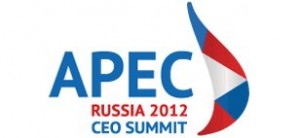
Если бы в 1989 году, когда милиция стреляла по демонстрантам на площади Тяньаньмэнь, а международное общество с интересом и надеждой взирало на советскую перестройку, какой-нибудь специалист спрогнозировал нынешний сценарий, его бы наверняка упрятали в желтый дом.
Что же произошло в Поднебесной? Случилось чудо? Нет…
Долгие годы в России я слышал, что, мол, «мы, как китайцы, должны были следовать политике мелких шагов, а вместо этого перешли к рыночной экономике методом шоковой терапии». Такие вещи у нас в Италии называют «городскими легендами», которые не имеют ничего общего с реальностью…. »
Статья Джузеппе Д’Амато Московский Комсомолец № 26032 от 4 сентября 2012 г. Giuseppe D’Amato Moskovskij Komsomolets.
APEC 2012, Basic Information.
4 Sep 2012APEC was founded as an informal consultative forum to promote economic cooperation, encompassing, as members, the leading economies in the region. When APEC admitted three new members during the third APEC Ministerial Meeting in Seoul in November 1991, the protocol was accepted to refer to the three new member economies as the People’s Republic of China; Hong Kong, China; and Chinese Taipei. As such, APEC’s members are always referred to as “Economies” rather than countries or nations. The use or display of national flags, symbols or anthems is prohibited and only simple nameplates of the member economies are displayed at any APEC function.
Today APEC includes 21 Asia-Pacific economies. APEC member economies are Australia, Brunei, Canada, Chile, China, Hong Kong China, Indonesia, Japan, Korea, Malaysia, Mexico, New Zealand, Papua New Guinea, Peru, the Philippines, Russia, Singapore, Chinese Taipei, Thailand, the United States, and Vietnam.
Members account for 54.9% of the world’s gross domestic product, 47.1% of the world’s goods and services trade, 44.5% of the world’s total accumulated direct investments, and 39.9% of the world’s population.
APEC–2012 declared priorities:
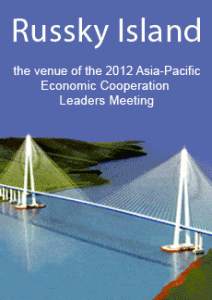
APEC – Russky Island from apec2012.ru
trade and investment liberalization, regional economic integration, strengthening food security, establishing reliable supply chains,intensive cooperation to foster innovative growth.
Russia proposes discussing the long-term prospects of regional and global integration, sustainable growth and new challenges to trade and investment liberalization, elimination of trade and investment barriers for small and medium-sized enterprises, and establishment of reliable supply chains.
The two days of the CEO Summit (Sept. 7th– 8th) will be devoted to an exchange of ideas between business and government leaders on the advantages and adverse effects of economic integration, the prospects for global and regional currencies, infrastructure development for economic growth, and the future of capitalism in general. Other sessions will include focus on the development of cities in a rapidly changing world, the emergence and role of transnational corporations, and the growth of the middle class in emerging markets.
In 2007 Russky Island was chosen as the site for the Asia-Pacific Economic Cooperation Leaders’ Week (APEC). Large-scale construction was launched on the island.
Russky Island is located in the Peter the Great Gulf and is part of Vladivostok’s Frunzensky district. The island is sometimes called the Far East’s Kronstadt. The Eastern Bosphorus Strait separates it from the Muravyov-Amursky Peninsula where Vladivostok, the capital of Russia’s Primorye Territory, lies.
Welcome
We are a group of long experienced European journalists and intellectuals interested in international politics and culture. We would like to exchange our opinion on new Europe and Russia.
Categories
- Breaking News (11)
- CIS (129)
- Climate (2)
- Energy&Economy (115)
- EU Eastern Dimension (85)
- Euro 2012 – Sochi 2014 – World Cup 2018, Sport (43)
- Euro-Integration (135)
- History Culture (198)
- International Policy (261)
- Military (74)
- Interviews (18)
- Italy – Italia – Suisse (47)
- Odd Enough (10)
- Poland and Baltic States (126)
- Religion (31)
- Russia (421)
- Survey (4)
- Turning points (4)
- Ukraine (176)
- Российские страницы (113)
Archives
- November 2020
- October 2020
- September 2020
- August 2020
- July 2020
- May 2020
- April 2020
- March 2020
- January 2020
- December 2019
- November 2019
- October 2019
- September 2019
- August 2019
- July 2019
- June 2019
- May 2019
- April 2019
- March 2019
- February 2019
- December 2018
- November 2018
- October 2018
- September 2018
- August 2018
- July 2018
- June 2018
- May 2018
- April 2018
- March 2018
- February 2018
- January 2018
- December 2017
- November 2017
- October 2017
- September 2017
- August 2017
- July 2017
- May 2017
- March 2017
- January 2017
- December 2016
- November 2016
- October 2016
- September 2016
- July 2016
- June 2016
- May 2016
- April 2016
- February 2016
- January 2016
- November 2015
- October 2015
- September 2015
- June 2015
- April 2015
- March 2015
- February 2015
- January 2015
- December 2014
- November 2014
- October 2014
- September 2014
- August 2014
- July 2014
- June 2014
- May 2014
- April 2014
- March 2014
- February 2014
- January 2014
- December 2013
- November 2013
- October 2013
- September 2013
- August 2013
- July 2013
- June 2013
- May 2013
- April 2013
- March 2013
- February 2013
- January 2013
- December 2012
- November 2012
- October 2012
- September 2012
- August 2012
- July 2012
- June 2012
- May 2012
- April 2012
- March 2012
- February 2012
- January 2012
- December 2011
- November 2011
- October 2011
- September 2011
- August 2011
- July 2011
- June 2011
- May 2011
- April 2011
- March 2011
- February 2011
- January 2011
- December 2010
- November 2010
- October 2010
- September 2010
- August 2010
- July 2010
- June 2010
- May 2010
- April 2010
- March 2010
- February 2010
- January 2010
- December 2009
- November 2009
- October 2009
- September 2009
- August 2009
Our books




